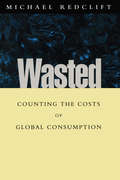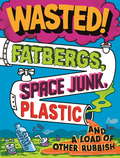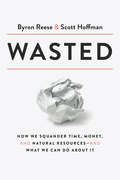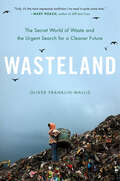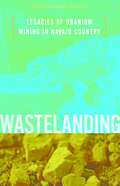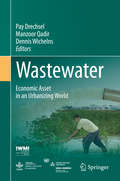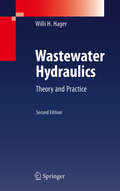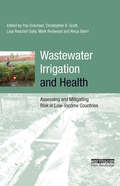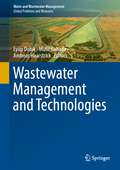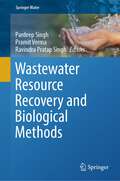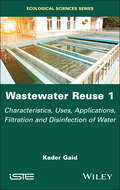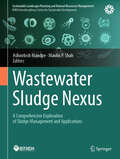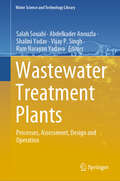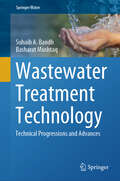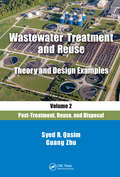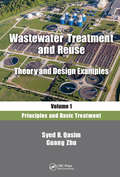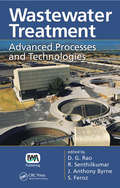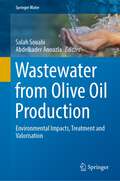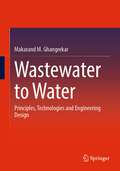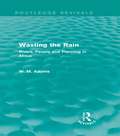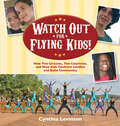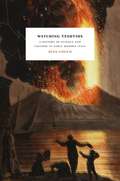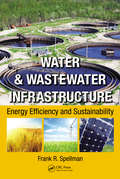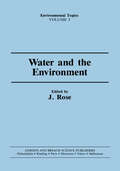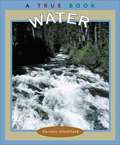- Table View
- List View
Wasted: Counting the costs of global consumption (Sustainable Development Set Ser.)
by Michael RedcliftSustainable development cannot be achieved solely at the international level. Without the creation of more sustainable livelihoods, it will remain a utopian and elusive goal. Yet given the huge differences in economic development and levels of consumption between North and South, how might this bebrought about?Taking the 1992 Rio Summit as its point of departure, Wasted examines what we now need to know, and what we need to do, to live within sustainable limits. One of the key issues is how we use the environment: converting natural resources into human artifices, commodities and services. In the process of consuming,we also create sinks. Today, these sinks - the empty back pocket in the global biogeographical system - are no longer empty. The fate of the global environment is indissolubly linked to our consumption: particularly in the energy-profligate North.To understand and overcome environmental challenges, we need to build the outcomes of our present consumption rates into our future behaviour: to accept sustainable development as a normative goal for societies; one that is bound up with our everyday social practices and actions. In this absorbing book, Michael Redclift argues that the way we understand and think about the environn1ent conditions our responses, and our ability to meet the challenge, and discusses tangible policies for increased sustainability that are grounded in recent research and practice.MICHAEL RedcliftIs Professor of International Environmental Policy at the Department of Geography, King's College London. He was previously Professor of International Environmental Policy at the University of Keele and before that Professor of Environmental Sociology at Wye College, University of London, and Director of the ESRC Global Environmental Change Programme. He is author and editor of numerous books, including Sustainable Development: Exploring the Contradictions (1987), Social Theory and the Global Environment (1994) and Sustainability: Life Chances and Lifestyles (1999).Originally published in 1996
Wasted: Fatbergs, Space Junk, Plastic and a load of other Rubbish
by Clive GiffordAimed at readers aged 9 and up, this book takes a look at the pollution and damage caused to our planet and the solar system through the lens of extreme waste manifestations, such as toxic smogs, grotesque fatbergs, mountainous landfills, marine garbage patches and space junk. It explores these human-created phenomena, uncovering their causes and impact, and asks what is being done to deal with them and prevent their recurrence. Real-life photographs are included, bringing home the extreme awfulness and scale of the problem.
Wasted: How We Squander Time, Money, and Natural Resources-and What We Can Do About It
by Byron Reese Scott HoffmanA riveting exploration of the complicated, and often surprising, ways that waste occurs in our businesses, our communities, and our lives&“A smart, unconventional book that takes readers far beyond what they think they know about a complex subject.&”—Kari Byron, former cast member of MythBusters Waste. We spend a great deal of energy trying to avoid it, but once you train your eyes to look for it, you&’ll see it all around you—in your home, your business, and your everyday life. In Wasted, futurist Byron Reese and entrepreneur Scott Hoffman take readers on a fascinating journey through this modern world of waste, drawing on science, economics, and human behavior to envision what a world with far less of it—or none of it at all—might look like. Along the way, they explore thought-provoking issues such as • why the United States got a higher proportion of its energy from renewable sources in 1950 than it does today • whether the amount of gold in unused mobile phones can be extracted for profit• how switching to water fountains on a single route from Singapore to Newark could prevent the use of 3,400 plastic bottles—on each flight• whether the amount of money you save buying goods in bulk is offset by the amount you lose when some spoil. Ultimately, the question of reducing waste is scientific, philosophical, and, most of all, complex. According to Reese and Hoffman, the rush toward simple answers has often led to well-meaning efforts that cause more waste than they save. The only way we can hope to make progress is to treat waste as the complicated issue it is. While the authors don&’t promise easy answers, in this compelling book they take an important step toward solutions by examining the questions at play, giving actionable steps, and ensuring that you&’ll never see the world of waste the same way again.
Wasteland: The Secret World of Waste and the Urgent Search for a Cleaner Future
by Oliver Franklin-WallisNAMED A BEST BOOK OF THE YEAR 2023 BY THE NEW YORKER, THE GUARDIAN, and KIRKUS REVIEWS An award-winning investigative journalist takes a deep dive into the global waste crisis, exposing the hidden world that enables our modern economy—and finds out the dirty truth behind a simple question: what really happens to what we throw away? In Wasteland, journalist Oliver Franklin-Wallis takes us on a shocking journey inside the waste industry—the secretive multi-billion dollar world that underpins the modern economy, quietly profiting from what we leave behind. In India, he meets the waste-pickers on the front line of the plastic crisis. In the UK, he journeys down sewers to confront our oldest—and newest—waste crisis, and comes face-to-face with nuclear waste. In Ghana, he follows the after-life of our technology and explores the global export network that results in goodwill donations clogging African landfills. From an incinerator to an Oklahoma ghost-town, Franklin-Wallis travels in search of the people and companies that really handle waste—and on the way, meets the innovators and campaigners pushing for a cleaner and less wasteful future. With this mesmerizing, thought-provoking, and occasionally terrifying investigation, Oliver Franklin-Wallis tells a new story of humanity based on what we leave behind, and along the way, he shares a blueprint for building a healthier, more sustainable world—before we&’re all buried in trash.
Wastelanding: Legacies of Uranium Mining in Navajo Country
by Traci Brynne VoylesWastelanding tells the history of the uranium industry on Navajo land in the U. S. Southwest, asking why certain landscapes and the peoples who inhabit them come to be targeted for disproportionate exposure to environmental harm.
Wastewater
by Pay Drechsel Manzoor Qadir Dennis WichelnsThe books provides a timely analysis in support of a paradigm shift in the field of wastewater management, from 'treatment for disposal' to 'treatment for reuse' by offering a variety of value propositions for water, nutrient and energy recovery which can support cost savings, cost recovery, and profits, in a sector that traditionally relies on public funding. The book provides new insights into the economics of wastewater use, applicable to developed and developing countries striving to transform wastewater from an unpleasant liability to a valuable asset and recasting urbanization from a daunting challenge into a resource recovery opportunity. "It requires business thinking to transform septage and sewage into valuable products. A must read for water scholars, policy makers, practitioners, and entrepreneurs". Guy Hutton, Senior Economist, Water and Sanitation Program, Water Global Practice, World Bank "This book provides compelling evidence and real solutions for the new 'resource from waste' approach that is transforming sanitation, boosting livelihoods, and strengthening urban resilience". Christopher Scott, Professor and Distinguished Scholar, University of Arizona "This book shows how innovative business thinking and partnerships around resource recovery and reuse fit well within an inclusive green economy and climate change adaptation and mitigation strategies". Akiça Bahri, Coordinator of the African Water Facility, Tunisia, and award-winning researcher
Wastewater Hydraulics
by Willi H. HagerThe second, enlarged edition of this established reference integrates many new insights into wastewater hydraulics. This work serves as a reference for researchers but also is a basis for practicing engineers. It can be used as a text book for graduate students, although it has the characteristics of a reference book. It addresses mainly the sewer hydraulician but also general hydraulic engineers who have to tackle many a problem in daily life, and who will not always find an appropriate solution. Each chapter is introduced with a summary to outline the contents. To illustrate application of the theory, examples are presented to explain the computational procedures. Further, to relate present knowledge to the history of hydraulics, some key dates on noteworthy hydraulicians are quoted. A historical note on the development of wastewater hydraulics is also added. References are given at the end of each chapter, and they are often helpful starting points for further reading. Each notation is defined when introduced, and listed alphabetically at the end of each chapter. This new edition includes in particular sideweirs with throttling pipes, drop shafts with an account on the two-phase flow features, as well as conduit choking due to direct or undular hydraulic jumps.
Wastewater Irrigation and Health: Assessing and Mitigating Risk in Low-income Countries
by Pay Drechsel Liqa Raschid-Sally Mark Redwood Christopher A. Scott Akiça BahriIn most developing countries wastewater treatment systems are hardly functioning or have a very low coverage, resulting in large scale water pollution and the use of very poor quality water for crop irrigation especially in the vicinity of urban centres. This can create significant risks to public health, particularly where crops are eaten raw. Wastewater Irrigation and Health approaches this serious problem from a practical and realistic perspective, addressing the issues of health risk assessment and reduction in developing country settings. The book therefore complements other books on the topic of wastewater which focus on high-end treatment options and the use of treated wastewater. This book moves the debate forward by covering also the common reality of untreated wastewater, greywater and excreta use. It presents the state-of-the-art on quantitative risk assessment and low-cost options for health risk reduction, from treatment to on-farm and off-farm measures, in support of the multiple barrier approach of the 2006 guidelines for safe wastewater irrigation published by the World Health Organization. The 38 authors and co-authors are international key experts in the field of wastewater irrigation representing a mix of agronomists, engineers, social scientists and public health experts from Africa, Asia, Europe, North America and Australia. The chapters highlight experiences across the developing world with reference to various case studies from sub-Saharan Africa, Asia, Mexico and the Middle East. The book also addresses options for resource recovery and wastewater governance, thus clearly establishes a connection between agriculture, health and sanitation, which is often the missing link in the current discussion on 'making wastewater an asset'.
Wastewater Management and Technologies (Water and Wastewater Management)
by Müfit Bahadir Andreas Haarstrick Eyüp DebikThis book edition on "Wastewater Management and Technologies" brings together a wealth of expertise by the authors, who exemplify the wide range of options available—from nature-based solutions to different levels of technology—and the different experiences through case studies from around the world, with a particular focus on conditions in developing countries. The book is part of a book series (special editions) based on the publication of the book "Water and Wastewater Management", published by Springer in 2022 (ISBN 978-3-030-9528-7). The part about "Wastewater Management and Technologies" edited in this book will be deepened with this first special edition in terms of technological topics.
Wastewater Resource Recovery and Biological Methods (Springer Water)
by Pardeep Singh Pramit Verma Ravindra Pratap SinghThe book is unique in highlighting the issue of wastewater as one of the important environmental issues. The uniqueness also lies in exploring the concepts of converting waste into resources in the form of bioenergy, biofertilizers through various biological methods. Given the international scenario, the chapters of this book are designed to include both anaerobic and aerobic methods of resource recovery from the industrial wastewater. The book is a step toward design with nature and the concept of green chemistry.Waste menace is one of the most voiced and unsolved problems in the entire world. The whole world is facing the threat of water pollution, soil pollution/ land pollution, odour pollution from the growing waste. Though we find many missions and programs at international, national, and regional level to solve the waste associated issues, this is mostly in context with the solid fraction of the waste. Very little is being done to manage the liquid part of the waste or what we call the wastewater.The conversion of wastewater has the potential to be converted to energy in the form bioenergy, bio-fertilizers, electricity, nutrient recovery, etc. The use of sludge as biofertilizers solves the problem of sludge management on the one hand and production of organic crops on the other. The biological treatment methods like sludge treatment gives the farmers the source of biofertilizers and organic manure for the plants. In the present scenario, energy crisis is also one of the issues that we are facing particularly in context with the thermal power plants which are environmentally highly polluting. Through various techniques like microbial fuel cells or biohydrogen, we get a source of cleaner energy. So, through this book, we try to produce the content and information to give the audience an understanding of the waste water as one of the environmental and health issues and mitigation strategies. The book gives a sufficient understanding of how waste can be turned into a resource.
Wastewater Reuse, Volume 1: Characteristics, Uses, Applications, Filtration and Disinfection of Water (ISTE Invoiced)
by Kader GaidWater issues are inextricably linked to sustainable development since water must meet the needs of present and future generations. The reuse of wastewater is a socioeconomic challenge for the development of drinking water and wastewater services. It has the following advantages: it increases usable water resources, preserves natural resources and alleviates water shortages caused by climate change. Wastewater Reuse 1 provides a comprehensive and educational overview of the many ways wastewater can be reused, the variety of treatments, their performance, their conditions of use and how to combine them to give wastewater a new lease on life. Droughts are already a concern in many parts of the world; however, we now have new technologies to rely on.
Wastewater Sludge Nexus: A Comprehensive Exploration of Sludge Management and Applications (Sustainable Landscape Planning and Natural Resources Management)
by Maulin P. Shah Ashootosh MandpeThis book is a groundbreaking book that explores the critical issue of managing and handling industrial sludge in wastewater treatment facilities. The proposed book addresses the urgent need for a comprehensive understanding of sludge management practices and introduces innovative solutions. The proposed book highlights the significance of industrial sludge management in ensuring sustainable and environmentally friendly wastewater treatment processes. It sheds light on the complex nexus between wastewater treatment plants, industries, and the resulting sludge generation. Through meticulous research and expert insights, this book explores various aspects of industrial sludge management, including sludge characterization, treatment technologies, disposal methods, resource recovery, and environmental sustainability. It presents a balanced approach, focusing on practical applications while emphasizing the importance of scientific understanding and innovation. By providing an in-depth analysis of the challenges and opportunities in this area, it becomes an indispensable resource for professionals, researchers, policymakers, and students alike. What sets this book apart is its unique content, which covers a wide range of topics related to industrial sludge management. It explores the latest advances in sludge treatment technologies, emphasizing their efficiency, cost-effectiveness, and environmental impact. Additionally, the book examines strategies for sludge minimization, resource recovery, and the utilization of sludge by-products in various industrial applications. The authors also discussed the regulatory frameworks and guidelines governing sludge management, ensuring that readers have a comprehensive understanding of the legal aspects surrounding this critical issue. Furthermore, the book explores the potential risks associated with improper sludge management and offers practical solutions to mitigate them. Overall, the proposed book fills a significant gap in the literature by providing a holistic and up-to-date account of this crucial field. It serves as a valuable guide, inspiring sustainable practices, promoting innovation, and ultimately contributing to the advancement of sludge management in wastewater treatment processes
Wastewater Treatment Plants: Processes, Assessment, Design and Operation (Water Science and Technology Library #130)
by Vijay P. Singh Shalini Yadav Ram Narayan Yadava Salah Souabi Abdelkader AnouzlaThe book provides technical information on the operation of wastewater treatment plants and strategies to be adopted for the design of plants, assessment, processes and technologies for wastewater treatment and reuse for irrigation and industry, including protecting the environment. It discusses the crucial parts that science, technology, and innovation play in formulating, implementing, and administrating wastewater treatment policy. It highlights the challenges that must be overcome to successfully adopt the wastewater treatment infrastructure regulations and provides some answers. It investigates how the operation of wastewater treatment plant technology can be used in a wide variety of fields, apart from other on-the-shelf publications on the market. It also delves into the core concepts of the operation of wastewater treatment plants. It explores how these concepts can be modified to fit a variety of contexts and uses. Applications such as managing facilities, dealing with pandemics, urban wastewater treatment and reuse, farming, and other applications are included in this book. Consequently, this book's content is engaging, and it will pique the interest of a diverse audience of readers who come from a wide variety of professional backgrounds. This book will be helpful to industrialists, researchers, entrepreneurs, professionals, planners, policymakers, environmental engineers, and others interested in the operation of wastewater treatment system management strategies through the application of breakthroughs in the operation of wastewater treatment plants. The book constitutes a database that can help companies guide the choice of a treatment technique considering operating and investment costs. Similarly, the book presents several solutions to problems encountered during the operation of treatment plants, particularly the challenges encountered at the biological and physicochemical treatment levels. The book also illustrates some design and sizing methods and methods for good practice to organize the extension of a treatment plant, if necessary, properly. The book also deals with options for resource recovery and wastewater governance, thus establishing a clear link between the performance of a treatment plant and obtaining treated water that
Wastewater Treatment Technology: Technical Progressions and Advances (Springer Water)
by Basharat Mushtaq Suhaib A. BandhAs global populations surge, the availability of clean water continues to decline, necessitating a paradigm shift toward pollution mitigation and sustainable water management. The indiscriminate disposal of untreated wastewater is no longer a viable option, underscoring the critical need for advanced treatment technologies. Wastewater Treatment Technology provides a comprehensive introduction to the core principles of wastewater treatment, coupled with the engineering design of unit processes essential for the sustainable management of municipal wastewater. The book systematically explores key aspects, including wastewater treatment methodologies, drinking water purification, water quality standards, sludge management, and treatment plant design. Each concept is presented with a strong theoretical foundation, ensuring clarity and coherence in technical applications. Additionally, the text integrates recent advancements in wastewater treatment technologies, reflecting the evolving landscape of the field.Developed from a course taught by the authors over several years, this book is tailored for undergraduate and postgraduate students with a background in environmental science, water resource management, and environmental engineering. It offers a robust grounding in fundamental principles while equipping readers with the expertise to design and optimize unit processes in municipal wastewater treatment systems. Industry professionals will also find it an invaluable reference for practical applications. Beyond academia, this book serves as a crucial resource for researchers and policymakers engaged in wastewater management. It provides scientific methodologies and analytical frameworks necessary for developing viable and sustainable strategies aligned with global environmental goals. Addressing a critical gap in wastewater treatment literature, this text offers a well-structured and comprehensive compilation essential for students, researchers, and decision-makers striving to achieve the UN Sustainable Development Goals (SDGs) through innovative and efficient wastewater solutions.
Wastewater Treatment and Reuse Theory and Design Examples, Volume 2: Post-Treatment, Reuse, and Disposal
by Guang Zhu Syed R. QasimThis book will present the theory involved in wastewater treatment processes, define the important design parameters involved, and provide typical values of these parameters for ready reference; and also provide numerical applications and step-by-step calculation procedures in solved examples. These examples and solutions will help enhance the readers’ comprehension and deeper understanding of the basic concepts, and can be applied by plant designers to design various components of the treatment facilities. It will also examine the actual calculation steps in numerical examples, focusing on practical application of theory and principles into process and water treatment facility design.
Wastewater Treatment and Reuse, Theory and Design Examples, Volume 1: Principles and Basic Treatment
by Guang Zhu Syed R. QasimThis book will present the theory involved in wastewater treatment processes, define the important design parameters involved, and provide typical values of these parameters for ready reference; and also provide numerical applications and step-by-step calculation procedures in solved examples. These examples and solutions will help enhance the readers’ comprehension and deeper understanding of the basic concepts, and can be applied by plant designers to design various components of the treatment facilities. It will also examine the actual calculation steps in numerical examples, focusing on practical application of theory and principles into process and water treatment facility design.
Wastewater Treatment: Advanced Processes and Technologies
by R. Senthilkumar D. G. Rao J. Anthony Byrne S. FerozEmphasizing new technologies that produce clean water and energy from the wastewater treatment process, this book presents recent advancements in wastewater treatment by various technologies such as chemical methods, biochemical methods, membrane separation techniques, and nanotechnology. It addresses sustainable water reclamation, biomembrane treatment processes, advanced oxidation processes, and applications of nanotechnology for wastewater treatment. It also includes integrated cost-based design methodologies. Equations, figures, photographs and tables are included within the chapters to aid reader comprehension. Case studies and examples are included as well.
Wastewater from Olive Oil Production: Environmental Impacts, Treatment and Valorisation (Springer Water)
by Salah Souabi Abdelkader AnouzlaThis book summarizes the recent research development concerning olive oil wastewater management: characterization, environmental impact, recovery and treatment. The book combines different chapters on the management of olive oil rejects using simple techniques with low investment and operating costs. The main focus of the book is:- Diagnosis, impacts of olive oil waste, and regulations- The valorization of the margins and the olive waste- Wastewater treatment and recovery- Evaluation of investments and operating costs of treatment techniques- Shaped by experience, the authors present their view and approach to each focus area of managing liquid and solid waste produced by crushing units.
Wastewater to Water: Principles, Technologies and Engineering Design
by Makarand M. GhangrekarThis textbook offers a complete comprehensive coverage of wastewater engineering from pollutant classification, design of collection systems and treatment systems including operational guidelines for the treatment plants. Apart from the primary and conventional secondary wastewater treatment, this book covers the details and design of advanced biological treatment systems such as sequencing batch reactor (SBR), up-flow anaerobic sludge blanket (UASB) reactors and hybrid reactor, with design examples and photographs of actual working reactors which is useful for students and practicing engineers. This textbook is designed to provide complete solution for the wastewater engineering for easy reference to the users. This textbook is an ideal reference for courses taught at the university undergraduate and postgraduate level in the field of civil/environmental engineering, chemical engineering, water management and environmental science. It should also appeal to practicing engineers in the wastewater engineering and effluent treatment plant designers.
Wasting the Rain: Rivers, People and Planning in Africa (Routledge Revivals)
by William M. AdamsFirst published in 1992, this title offers an experienced and constructive evaluation of the ways in which water resources have been developed in Africa. Adams argues that the best hope of productive development lies in working and engaging with local people and using local knowledge of the environment effectively. Modern, large-scale developments that have largely been ineffective are examined, and emphasis is placed on the importance of using the skills and concerns of those affected, such as small farmers, to develop ingenious water projects – an approach that can be applied worldwide. This is an interesting and relevant title, which will be of particular value to those with an interest in the developments in water resource conservation over the past two decades.
Watch Out for Flying Kids: How Two Circuses, Two Countries, and Nine Kids Confront Conflict and Build Community
by Cynthia LevinsonCan circus change the world? Award-winning author Cynthia Levinson reveals the inspiring real-life stories of Black and white American kids and Jewish and Arab kids from Israel as they join forces to learn from each other and create remarkable circus performances.Welcome to the world of social circus—a movement that brings kids from different worlds together to perform amazing acts on a professional level! Watch from your seats as we follow the participants of two specific circuses: Circus Harmony in St. Louis, whose participants are inner-city and suburban Black and white kids, and Circus Galilee in Israel, whose participants are Jewish and Arab. The members may be from different demographics, different races, and different religions, but they work together to learn not how to overcome assumptions, animosity, and obstacles, and also to put their trust in the hands of people who may be very different from themselves.Featuring in-depth one-on-one interviews, extensive research, and engaging storytelling, this inspiring book highlights stories of collaboration, compromise, and overcoming obstacles. Includes informational sidebars and photographs throughout.
Watching Vesuvius: A History of Science and Culture in Early Modern Italy
by Sean CoccoMount Vesuvius has been famous ever since its eruption in 79 CE, when it destroyed and buried the Roman cities of Pompeii and Herculaneum. But less well-known is the role it played in the science and culture of early modern Italy, as Sean Cocco reveals in this ambitious and wide-ranging study. Humanists began to make pilgrimages to Vesuvius during the early Renaissance to experience its beauty and study its history, but a new tradition of observation emerged in 1631 with the first great eruption of the modern period. Seeking to understand the volcanoOCOs place in the larger system of nature, Neapolitans flocked to Vesuvius to examine volcanic phenomena and to collect floral and mineral specimens from the mountainside. aIn "Watching Vesuvius," Cocco argues that this investigation and engagement with Vesuvius was paramount to the development of modern volcanology. He then situates the native experience of Vesuvius in a larger intellectual, cultural, and political context and explains how later eighteenth-century representations of NaplesOCoof its climate and characterOCogrew out of this tradition of natural history. Painting a rich and detailed portrait of Vesuvius and those living in its shadow, Cocco returns the historic volcano to its place in a broader European culture of science, travel, and appreciation of the natural world.
Water & Wastewater Infrastructure: Energy Efficiency and Sustainability
by Frank R. SpellmanA critical aspect of sustainability associated with water and wastewater systems is to maintain and manage infrastructure in the most efficient and economical manner while complying with environmental regulations and keeping rates at acceptable levels. Given the high cost of fuel, our growing population, and the associated increase in energy needs,
Water & the Environment: South Florida And The Bahamas (Environmental Topics Ser. #Vol. Vi)
by RoseThis compilation of papers provides useful insights on the differing approaches to water quality and the diversity of strategies in water quality management worldwide. Considering the current situation and looking to the future, the aim of this publication is to provide a sensible addition to the literature by concentrating on several important aspects of water and the environment.
Water (A True Book)
by Christin DitchfieldDescribes the properties and uses of water, its importance to life on earth, and the water cycle.
